Summary of the future of work research project
Before starting to draft scenarios on what the labour market in Estonia until 2035 will be like, it is necessary to understand what kind of changes are to be expected on the basis of existing evidence. Within the framework of the future of work project, we will study both the demographic changes and the changing of the nature of work, and afterwards we will place the scenarios in the context of social system and taxation.

Researches from the University of Tartu and Tallinn University Raul Eamets, Allan Puur, Magnus Piirits and Kristi Anniste have started a research project studying what the division of labour market participants by age and qualification could be like in the future in the case of various developments of economy and migration. This should provide a better picture of what the challenges of different development trajectories are, and maybe also help understand what kind of serious bottlenecks await us due to the growth of old-age population if the present path of development continues.
The studies of the dimensional change of work also contribute to the scenarios. One of the changes is the internationalisation of work because of physical migration and the spread of virtual work.
Kaire Holts from the University of Hertfordshire is studying the nature of virtual work (incl. platform work) and its significance in the context of future work. Besides theoretical treatments, we plan to conduct a platform work survey in cooperation with the University of Hertfordshire and the think tanks of Brussels in order to get an overview of how much this form of work is used in Estonia.
Ave Lauren from the European Migration Network is drafting the typologies of short-term work migration and analysing different types of work migration. We study the changing of the nature of work both from the legal aspect and from the viewpoint of the organisation of work.
Merle Erikson and Annika Rosin (University of Tartu) are studying the options for the legal status of employees in Estonia, and analysing whether the new legal solutions introduced in other countries would work in the Estonian context.
Heejung Chung from the University of Kent is comparing the data on flexitime and flexplace work in Estonia in 2005–2010, and linking the results to the data of international theoretical literature on what increased flexibility in the employment relationship might entail for the employee, the employer, or the state.
The key problem after the scenarios are completed is how to translate them into decision-making points on our political landscape, or what the realisation of some of the scenarios would mean to our social system and tax system, and if there are any good examples around the world of the measures for mitigating the risks of future work. The researchers from Praxis, Centar and the University of Tartu will analyse these questions, using the data of international literature, interviews and transferring of the results of the scenarios into orders of magnitude with the help of a quantitative model.
Latest news
-
11.02 2026Study: Impacts of low birthrate on pensions are primarily mitigated by funded pensions
According to the Foresight Centre’s new study “Pension Size and Purchasing Power by 2050”, a multi-pillar pension system makes pensions more resilient to demographic shocks, spreading risks between the labour market and capital markets.

 An independent think tank at the Riigikogu
An independent think tank at the Riigikogu